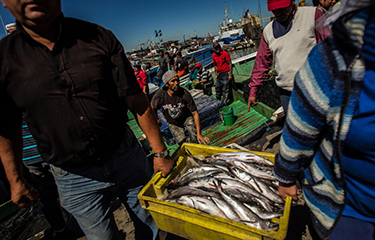WWF, Walmart Foundation piloting intervention program in Chile

The World Wildlife Fund (WWF) and Walmart Foundation have teamed up to develop a holistic approach to improve wild-caught fisheries and aquaculture in Chile.
The 18-month pilot collaboration is intended to serve as a pilot for further collaborations elsewhere around the world, according to both organizations.
The Walmart Foundation, established in 1982 to support local communities, and WWF, founded in 1961 to conserve natural resources, described the goal of its seafood-based collaboration as "achieving positive impacts across critical seascapes."
“The holistic approach being developed by the Walmart Foundation, World Wildlife Fund, and Conservation International aims to scale environmental, social, and economic improvements in wild-caught fisheries and aquaculture production by driving change within a specific geography or jurisdiction, rather than a single fishery or aquaculture production system, via combining market, policy, and finance levers," WWF Oceans Markets Vice President Caroline Tippett said. "The overall intent is to build on current, effective improvement approaches to drive change at a regional scale more efficiently."
Tippett said there are three pillars the collaboration is focused on building to create long-term changes the global seafood industry.
“The main goals of the collaboration are to: one, create guidelines for the development and implementation of a jurisdictional approach that can be applied to a variety of seascapes and farming systems; Two, design and pilot innovative blue financing to scale fishery improvement efforts globally; Three, establish a permanent infrastructure for electronic catch documentation and traceability tools,” Tippett said.
The first pillar involves jurisdictional approaches, also defined as interventions, in order to encourage governments and companies to work toward sustainability, the improvement of local livelihoods, and responsible management of natural resources. By necessaity, this approach is defined by governmental and sub-national boundaries instead of social or environmental boundaries.
“WWF and CI are developing an integrated jurisdictional approach framework to effectively address key sustainability issues in the context of cumulative impacts and multiple users," Tippett said. "We anticipate this framework will be useful globally for those looking to develop and implement jurisdictional approaches, policymakers, and market partners interested in expanding their sustainable seafood policy to include support of similar approaches."
The second pillar of the project is focused on blue financing – loans or investments that are used to support ocean and coastal preservation as well as clean water resources.
“The blue finance pillar is focused on the design and pilot of a financing mechanism with the aim of reversing the global trend of fisheries decline. WWF is working with Finance Earth, a U.K.-based impact investment advisory and fund manager, to develop a sustainable financing mechanism that enables upfront capital to be channeled at speed and scale to projects on the ground, while also leveraging private-sector participation through volume-based fees.” Tippett said. “Once scaled, this concept has the potential to leverage new funding from public and private investors and solve the problem of short-term, ad hoc, and insufficient funding for projects such as FIPs, one of the big bottlenecks to scaling conservation efforts globally.”
Tippett said she hopes the pilot project in Chile helps the organizations develop an action plan that can be replicated elsewhere globally.
“WWF is working with local stakeholders in Chile to address drivers of unsustainable fishing, focusing on multiple small pelagic fisheries that are an important source of feed ingredients for Chilean farmed salmon," Tippett said. "We aim to deliver systems-level solutions and positive environmental, social, and economic impacts. This also includes working to implement robust, electronic traceability within these small pelagic fisheries. Evolving the electronic catch documentation system that’s being used by the Chilean government to capture key information about source products in this important supply chain will be a step forward in advancing traceability in feed fisheries."
Walmart Foundation Vice Presient and Chief Operating Officer Julie Gehrki said her group's interest in Chile was in sustaining fishing and aquaculture as a way of life for over 300,000 people Chileans as well as conserving the large biodiversity of the country's coastline, which includes biomes such as kelp forests, seagrasses, and coastal wetlands.
“Aquaculture is poised for exponential growth to meet global seafood demand, and with impending impacts on climate, there is an urgent need to meaningfully address ocean health. Piloting innovative financial vehicles to support fisheries’ adoption of traceable and responsible practices in the biodiverse seascape of Chile is a demonstrable example of how the Walmart Foundation is committed to connecting the dots between climate and biodiversity,” Gehrki said.
WWF said the blue sustainable financing mechanism for the project in Chile is expected to be launched in Q1 2023, followed by the jurisdictional approach guidance documents in Q2 2023.
Photo courtesy of WWF






Share